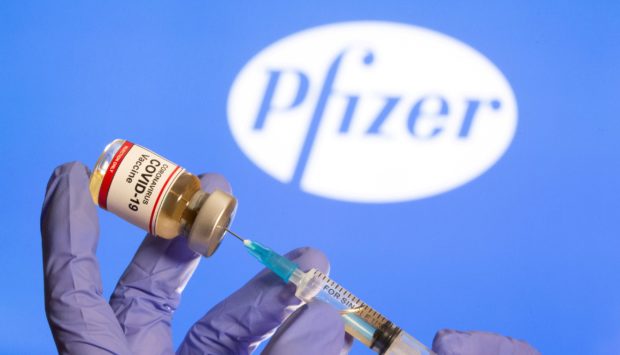
SIGN OF HOPE Expectations are high following Britain’s approval on Wednesday of the Pfizer-BioNTech vaccine for general use. —REUTERS
GENEVA — World Health Organization (WHO) officials on Friday warned governments and citizens not to drop their guard against the COVID-19 pandemic even with vaccines nearing rollout, saying health-care systems could still buckle under pressure.
“Progress on vaccines gives us all a lift and we can now start to see the light at the end of the tunnel,” WHO Director General Tedros Adhanom Ghebreyesus told a Geneva news conference.
“However, WHO is concerned that there is a growing perception that the COVID-19 pandemic is over,” Tedros added.
He said decisions made by citizens and governments would determine the pandemic’s course and when it would end.
“We know it’s been a hard year and people are tired, but in hospitals that are running at or over capacity it’s the hardest it can possibly be,” Tedros said.
WHO’s top emergency expert Mike Ryan also cautioned against complacency in the wake of a vaccine rollout.
“Vaccines do not equal zero COVID,” he said. “Vaccination will add a major, major, powerful tool to the tool kit that we have. But by themselves, they will not do the job.”
Ryan added that not everyone will be able to receive a vaccine by early next year.
He said some countries would have to sustain very strong control measures for some time or they would risk a “blowup” in cases, and a yo-yoing of the pandemic.
“We are in a pivotal moment in some countries. There are health systems in some countries at the point of collapse,” Tedros said, without referring to specific countries.
The coronavirus emerged in Wuhan, China, a year ago. More than 65 million people have since been reported to be infected and nearly 1.5 million killed globally.
The arrival of a vaccine should see deaths reduce “significantly” by early next year, British medical chiefs said.
But they also warned that social mixing over Christmas could cause another spike before then.
Pressure
Britain on Wednesday became the first Western country to approve an inoculation from Pfizer-BioNTech for general use, piling pressure on other countries to swiftly follow suit.
Moscow on Saturday began vaccinating workers in 70 coronavirus vaccine centers across the Russian capital.
Russia was one of the first countries to announce the development of its Sputnik V vaccine — dubbed after the Soviet-era satellite — in August, but before beginning final clinical trials which, currently, are underway, involving some 40,000 volunteers.
Health officials on Saturday reported 28,782 new infections, bringing the national total to 2,431,731 cases since the beginning of the pandemic in Russia —which had the fourth highest caseload in the world.
Green light
The United States is expected to give a green light later this month after it clocked a record 225,000 new infections.
Two promising vaccines could soon receive emergency use authorization from the US Food and Drug Administration, and some 20 million Americans could be vaccinated this year, helping stem the tide of the virus in the world’s worst-hit nation.
With the imminent arrival of vaccines that need storage at ultralow temperatures, US companies are preparing for a massive logistical effort to aid their distribution.
Firms specializing in insulating containers are on a war footing after Pfizer-BioNTech said their vaccine needs to be stored at -70 degrees Celsius.
Meat processing giant Smithfield said it was ready to put the cold rooms at its abattoirs at the disposal of rollout operations.
US logistics giant UPS is producing 500 kilograms of dry ice an hour in its depots and has developed portable freezers capable of storing the vaccines at temperatures down to -80 Celsius.
‘End acute phase’
The WHO has backed the COVID-19 Vaccines Global Access (Covax) program which seeks to ensure equitable distribution of vaccines and to date has seen 189 countries join.
The organization’s chief scientist, Soumya Swaminathan, said she hoped half a billion vaccine doses would be available for distribution by the Covax scheme in the first quarter of 2021, with an initial plan to vaccinate 20 percent of populations at highest risk, including health workers and people over 65.
“The goal is to get at least 2 billion doses by [the] end of 2021 which will be enough to vaccinate 20 percent of the populations of countries that are part of Covax,” Swaminathan said.
This would be enough to “bring to an end the acute phase of the pandemic” by reducing mortality and the impact on health systems, she said.
Covax is co-led by the Gavi vaccines alliance, the WHO and the Coalition for Epidemic Preparedness Innovations.
The United States has not signed up to the scheme.